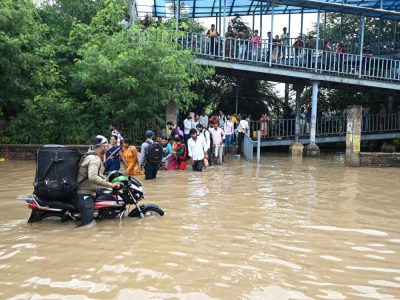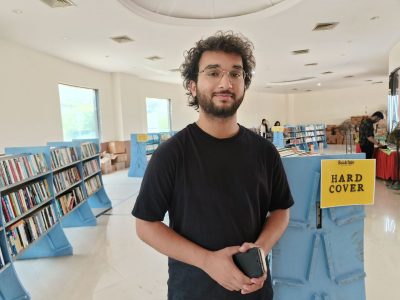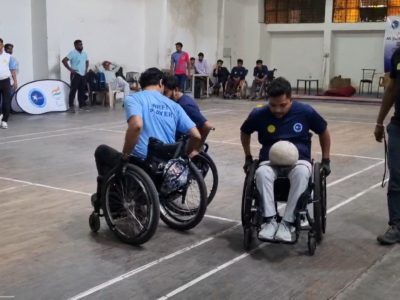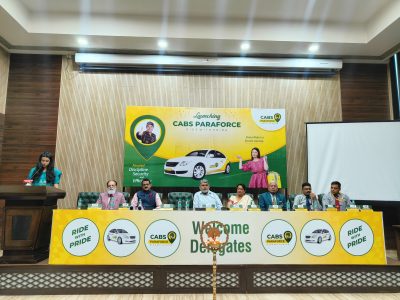After the Supreme Court stayed the airing of the controversial series titled ‘UPSC Jihad’ by Sudarshan TV, Patriot spoke to one of the petitioners seeking the stay in the Delhi High Court. Excerpts from the interview:
The show Bindas Bol’s series titled ‘UPSC Jihad’ hosted by Suresh Chavhanke whose promotional videos created a stir with their controversial content was halted from being aired. However, the first episode of the nine-part series was aired after the I&B ministry’s nod.
The Supreme Court judgement came on 15 September in response to a plea by Firoz Iqbal Khan claiming that the programme contained derogatory statements about the Muslim community and was divisive in nature. The apex court stopped the further airing of the show.
Patriot talked to Syed Mujtaba Athar, a research scholar at the Faculty of Law, Jamia Millia Islamia, the main petitioner in the PIL representing the students of the University. The case is being represented by Shadan Farasat, an advocate practising in the Supreme Court, he has also filed an intervention petition in the apex court, which has been accepted, seeking to become party to the petition filed by Firoz Iqbal Khan and others. Athar, who hails from the UP town of Rae Bareli, is currently pursuing his PhD from Jamia, had got his Bachelor’s at the same university after which he pursued LLM in International law from South Asian University, Delhi.
As an undergraduate, he worked towards the revival of the Jamia Discussion Forum in 2012 which was a teacher-student discussion platform to give voice to marginalised communities originally created in the aftermath of 2002.
1. What were your motivations behind filing a PIL against the show?
I was in my workplace when someone shared the video clip of the promo of the show to be aired on Sudarshan TV. I found the claims being made regarding the University I am currently a part of and the general idea behind the show very disturbing, to say the least.
The main idea is to ensure that such things (misleading news) are not normalised. Besides, relief in such a case from a legal standpoint brings home that spreading hatred against a community goes against the fabric of the Constitution, in effect making it illegal — giving legal backing to shutting down hate speech.
Constant attacks on the intelligentsia makes greater participation of communities, especially SC, ST and minorities more difficult. For example, earlier SC/STs were given accessible financial support; now they are required to first pay the fee and then wait for the approval of scholarships and refunds. As a result, many are forced to pull out of college. And this show does just that: targets a minority institute and its scholars.
Thus, this isn’t a question about the targeting of one educational institution, but that of the entire set-up where Muslims have somehow become a soft target. Islamophobia has now been normalised and all these things combined prompted me to file a petition in court against the airing of the show.
2. After watching the first episode, do you stand by your opinion or do you think that the content of the promo was just a way of grabbing eyeballs?
I think Suresh Chavhanke has the ability to sensationalise every aspect of his show. He is targeting an entire community and also the mechanism of the IAS for publicity.
The armed forced and civil services have always epitomised the very essence of looking beyond caste, creed, religion and sex when it comes to serving the country. By making the claims, Chavhanke is challenging these services and their functioning and by extension challenging the democratic fabric of the country. A lot of the claims he makes in the show are concerning to say the least.
The Honourable Judge of the High Court has not dismissed our petition, and even though not being able to get the show to stop from airing is a setback, the court has said that Sudarshan News should comply with the broadcast guidelines which we believe it violates. So we plan to take the legal battle forward.
3. Don’t you think that seeking a ban amounts to challenging press freedom?
Journalism is about narrating the facts but when an agenda drives the narration of information, it is not journalism. Freedom of press has its own morals and ethics – you need to give people the facts but not while driving an agenda of targeting a community and the fraternity of IAS and other civil services. There is also a lack of jurisprudence on the issue of hate speech which we are hoping would receive more attention through this petition where the boundaries of such issues and freedom of the press can be defined.
4. Do you agree with Jamia’s VC statement to Indian Express that Chavhanke has “given a secular definition to the term jihadi”?
I understand her standpoint, even though I do not agree with the choice of words. She has taken the moral high ground in not challenging the airing of the show. The use of words like ‘UPSC Jihad’show that the channel was trying to paint a picture where Muslim candidates are being targeted
5. Why do you think Jamia Millia Islamia was the only university that was named in the promo of the show, when it is based on the UPSC selection process?
Firstly, Jamia’s Residential Coaching is available for minorities: SC, ST and women. Many who cracked the civil services exams belong to these groups, not just Muslims. So, the naming of Jamia is very problematic.
There are many organisations, even ideological ones, which assist aspirants in cracking the exam while providing financial and educational support.
6. Do you feel that in seeking a ban, you have somehow assisted its popularity — as has been seen in the case of movies?
Hatred has become mainstream, so saying that because of a petition seeking to stop the airing of the show it has gained more viewers would be incorrect. Legal remedies in such cases not only provide legitimacy to the cause but also the future framework on which such issues can be resolved.
7. The Minority Commission provides assistance to all applicants from minority communities appearing for the civil services exams, so why do you think that questions are being raised around the participation of Muslims?
Since Muslims form the largest minority in the country, it is often said they receive the most benefits. This thinking cannot be substantiated with data.
Reinforcing the misinformation being spread on social media and WhatsApp against Muslims is easy and it is often used to gain popularity any which way. People using such misinformation to further their own agenda reinforce communal divides and use public sentiments for their own good.
8. Do you think advertisers like Amul pulling out of Sudarshan TV is a victory?
There has been no official statement from Amul regarding the advertisements it has been giving the channel. But I see a lot of organisations working towards fixing responsibility of advertisers when it comes to sponsoring such shows and it is very heartening. Advertisers can be given the benefit of doubt as often it is third parties that deal with different media outlets. But in recent times there has been a positive response from them.
And as a responsible company, it is their moral duty to ensure that they do not sponsor such shows in the future.
9. What are your views about hate speech on electronic media in general?
This show is one of the offshoots of the larger problem plaguing the news broadcasting industry today. The unprecedented mushrooming of news channels in recent years coupled with the revenue generation model based on ads which in turn is based on the TRP, does more harm than good. Viewers are being shocked with unconventional facts and visuals, instigated with fear or jingoism, thereby neutralising their ability to comprehend and judge things on merit.
This order of the Supreme Court may help develop much needed jurisprudence around hate speech propelled by the press, the objective regulation of freedom of speech and freedom of press.
We have even submitted in our intervening application at the Supreme Court that several international media and human rights organisations have compared the hatred propelled by many Indian news channels against Muslims to the dog-whistling of some Rwandan news channels that led to the Rwandan Genocide in 1994. Humanity must not be pushed to witness another Rwandan tragedy. I am confident that these judicial pronouncements will play their part to prevent such travesty and strengthen democracy.
(Cover: Syed Mujtaba Athar, the lead petitioner in a case against the airing of Sudarshan TV’s “UPSC Jihad” show)





